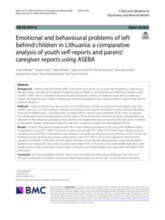Background
Children being left behind (LBC) in their home countries due to parental emigration is a global issue. Research shows that parents’ emigration negatively affects children’s mental health and well-being. Despite a high number of LBC, there is a dearth of data from Eastern European countries. The present study aims to collect and analyse self-reported data on LBC emotional and behavioural problems and compare children’s reports with those of parents/caregivers.
Methods
A cross-sectional study was conducted in 24 Lithuanian schools, involving parents/caregivers and their children aged 12 to 17. The authors employed self-reported measures, including the Achenbach System of Empirically Based Assessment (ASEBA) tools – Child Behaviour Checklist (CBCL 6/18) and Youth Self Report (YSR 11/18), to evaluate the emotional and behavioural problems of the children. These instruments had been translated, standardised, and validated for the Lithuanian population. Data collection took place between January 2022 and April 2023. In addition to descriptive analysis, multivariate regression was used to adjust for various sociodemographic factors.
Conclusion
This study highlights that LBC report more emotional and behavioural challenges than their non-LBC peers, while parent/caregiver assessments show lower problem scores for LBC. Gender, living environment, school-related issues, and engagement in hobbies have influenced these outcomes. These findings underscore the multifaceted nature of the experiences of LBC and the importance of considering various contextual factors in understanding and addressing their emotional and behavioural well-being.

